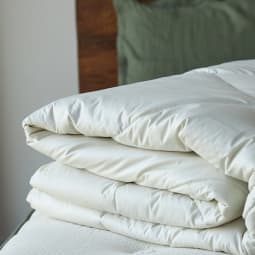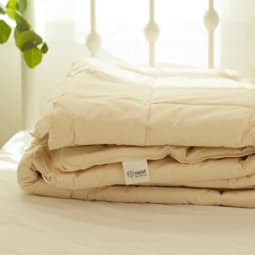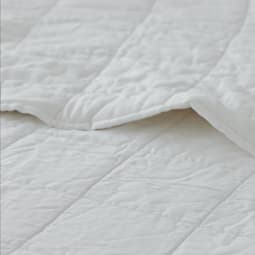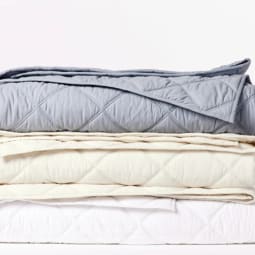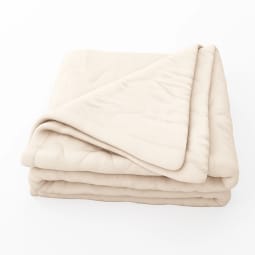Ready to snooze in your own personal safe, sustainable cocoon? Read on for the six best organic comforters available right now. In the U.S., organic crops are grown in soil that has not been treated with synthetic fertilizers, pesticides, or other prohibited substances within the last three years. And organically grown animals were raised in “living conditions accommodating their natural behaviors (like the ability to graze on pasture), fed 100% organic feed and forage, and not administered antibiotics or hormones,” according to the USDA1. So, an organic comforter will be made from materials that can be grown organically—usually cotton or wool. While materials like recycled plastic bottles (originally made from petroleum) and bamboo or eucalyptus (created using a process that requires added chemicals) are often touted as having lower environmental impacts, they are not organic and should not be labeled as such. The standard was created 20 years ago in response to an increasingly global textile market. “Textiles travel the world a lot, and they have a really high carbon footprint,” Lori Wyman, a representative of GOTS North America, tells mindbodygreen. “Cotton could be grown in the U.S., shipped to Turkey to be spun into yarn, go somewhere else to be woven, and then end up back in the U.S. to be sold.” By checking in on spinning facilities, knitters, dye houses, etc., every one to three years, GOTS auditors ensure that no potentially harmful chemicals were added anywhere in the process. There are also animal rights and fair trade elements to the GOTS standard, which you can read in full here. As consumer demands grow for organic and sustainable products, more companies are seeking out GOTS certifications. Wyman notes that in the past six years alone, the number of certified companies has increased around fourfold. Some other labels you might see on an organic comforter these days include OEKO-TEX 100 (certifies it has been tested for substances that could harm human health) and Fairtrade (certifies it was created by people who were paid a living wage and working in safe conditions). As for downsides, this breathable blanket is not vegan. Starting at $359 for a twin size, it’s definitely on the pricey side—especially considering the organic cotton cover is sold separately.








